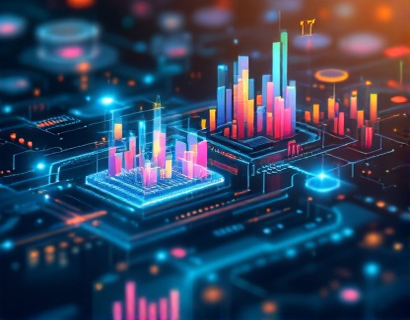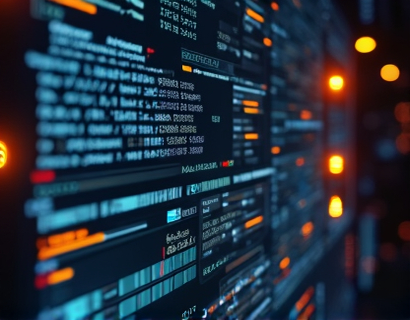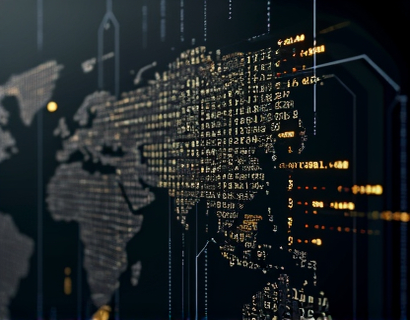Revolutionizing Digital Finance: The Synergy of AI and Crypto
The intersection of artificial intelligence and cryptocurrency is ushering in a new era of digital finance, one that promises to redefine how we interact with financial services and manage our assets. This convergence is not just a technological advancement but a paradigm shift that is transforming the landscape of FinTech. As we delve into this topic, it's essential to understand the foundational technologies driving this revolution and their implications for the future.
Understanding AI and Cryptocurrency
Artificial intelligence, at its core, involves the simulation of human intelligence processes by machines, particularly computer systems. These processes include learning, reasoning, and self-correction. In the context of digital finance, AI is leveraged to analyze vast amounts of data, identify patterns, and make predictions with a level of accuracy and speed unattainable by human analysts.
Cryptocurrency, on the other hand, is a digital or virtual currency that uses cryptography for security. It operates on a decentralized network, typically a blockchain, which ensures transparency and immutability. The most well-known cryptocurrency is Bitcoin, but there are thousands of others, each with unique features and use cases. The combination of AI and cryptocurrency creates a powerful synergy that enhances the functionality, security, and efficiency of digital financial systems.
The Role of AI in Cryptocurrency
One of the most significant impacts of AI on cryptocurrency is in the realm of trading and investment. AI-driven trading algorithms can process and analyze market data in real-time, identifying trends and making trades at optimal moments. These algorithms are not bound by human emotions such as fear and greed, which can lead to irrational decision-making. As a result, AI-powered trading can potentially yield higher returns and lower risks compared to traditional methods.
Moreover, AI is instrumental in enhancing the security of cryptocurrency transactions. Blockchain technology, the backbone of most cryptocurrencies, already provides a high level of security through its decentralized and transparent nature. However, AI can further bolster this by detecting and preventing fraudulent activities. Machine learning models can be trained to recognize unusual patterns or behaviors that may indicate a security breach, allowing for swift action to be taken.
Smart Contracts and Automated Processes
Smart contracts are self-executing contracts with the terms of the agreement directly written into code. They run on blockchain networks and automatically enforce and execute the terms of the contract when predefined conditions are met. AI enhances smart contracts by adding a layer of intelligence that can adapt to changing conditions and make more complex decisions. For instance, AI can analyze real-time data to adjust the parameters of a smart contract dynamically, ensuring that the contract remains relevant and effective.
Automated processes powered by AI and blockchain can streamline various financial operations, from supply chain finance to insurance claims. For example, in supply chain finance, AI can predict demand and optimize inventory levels, while smart contracts can automatically release payments to suppliers once the conditions are met. This not only speeds up transactions but also reduces the need for intermediaries, lowering costs and increasing efficiency.
Personalized Financial Services
The integration of AI in digital finance extends to providing personalized financial services to individuals and businesses. AI algorithms can analyze a user's financial data, including spending habits, income, and credit history, to offer tailored financial advice and product recommendations. This level of personalization is particularly valuable in the crypto space, where the complexity and volatility of assets can be overwhelming for many users.
Robo-advisors, powered by AI, can manage investment portfolios, including crypto assets, by continuously rebalancing to optimize returns based on the user's risk tolerance and financial goals. These platforms can also provide real-time insights and alerts, helping users make informed decisions and stay ahead of market movements.
Enhancing User Experience
The user experience in digital finance is significantly improved through the use of AI. Chatbots and virtual assistants, driven by natural language processing (NLP), can provide 24/7 customer support, answering queries and guiding users through complex financial processes. These AI-powered tools can understand and respond to user requests in a human-like manner, making the interaction more intuitive and user-friendly.
Additionally, AI can enhance the onboarding process for new users. By analyzing user data and behavior, AI systems can pre-fill forms, identify necessary documents, and guide users through the setup process, reducing friction and increasing adoption rates. This is particularly important in the crypto space, where the barrier to entry can be high due to the technical nature of the assets and platforms.
Risk Management and Compliance
Risk management is a critical aspect of digital finance, and AI plays a pivotal role in this area. AI algorithms can monitor transactions and user behavior to detect potential risks such as money laundering, fraud, and market manipulation. By identifying anomalies and patterns that deviate from the norm, AI can help financial institutions and regulatory bodies take proactive measures to mitigate risks.
Compliance with regulatory requirements is another area where AI shines. The crypto industry is subject to varying regulations across different jurisdictions, and keeping up with these changes can be challenging. AI can help ensure compliance by continuously monitoring regulatory updates, assessing the impact on business operations, and automating the necessary adjustments. This not only reduces the risk of non-compliance but also saves time and resources for financial institutions.
Decentralized Finance (DeFi) and AI
Decentralized Finance, or DeFi, is an emerging sector within the crypto ecosystem that aims to create financial services without traditional intermediaries. AI is a key enabler of DeFi, offering solutions that enhance liquidity, improve lending and borrowing mechanisms, and create more efficient marketplaces. For instance, AI-driven liquidity pools can optimize the allocation of assets to maximize returns while minimizing risk.
AI also plays a crucial role in decentralized lending and borrowing platforms. By analyzing user data and market conditions, AI can assess creditworthiness and set interest rates dynamically, ensuring fair and efficient transactions. This not only democratizes access to financial services but also increases the overall efficiency of the DeFi ecosystem.
Challenges and Considerations
While the integration of AI and cryptocurrency offers numerous benefits, it also presents several challenges that need to be addressed. One of the primary concerns is the ethical use of AI. Ensuring that AI systems are transparent, fair, and free from bias is essential to maintain trust and credibility in the financial sector. Additionally, the complexity of AI algorithms can make it difficult to audit and regulate, posing challenges for compliance and oversight.
Another consideration is the technical expertise required to develop and maintain AI-powered financial solutions. The crypto and AI industries are both highly technical, and finding professionals with the necessary skills can be challenging. Moreover, the rapid pace of technological change means that continuous learning and adaptation are essential to stay ahead.
Future Prospects
The future of digital finance is bright, with AI and cryptocurrency set to drive further innovation and transformation. As AI technologies continue to advance, we can expect even more sophisticated solutions that enhance the functionality and accessibility of financial services. The combination of AI and blockchain is likely to give rise to new financial models and instruments, opening up new opportunities for investors, businesses, and individuals alike.
Moreover, the increasing adoption of 5G and other advanced communication technologies will facilitate faster and more reliable data transmission, enabling real-time AI-driven decision-making. This will further enhance the efficiency and responsiveness of digital financial systems, making them more resilient and user-friendly.
In conclusion, the convergence of AI and cryptocurrency is revolutionizing digital finance, offering intelligent solutions that enhance security, efficiency, and personalization. As this synergy continues to evolve, it will play a crucial role in shaping the future of financial services, making them more accessible, transparent, and user-centric.










































